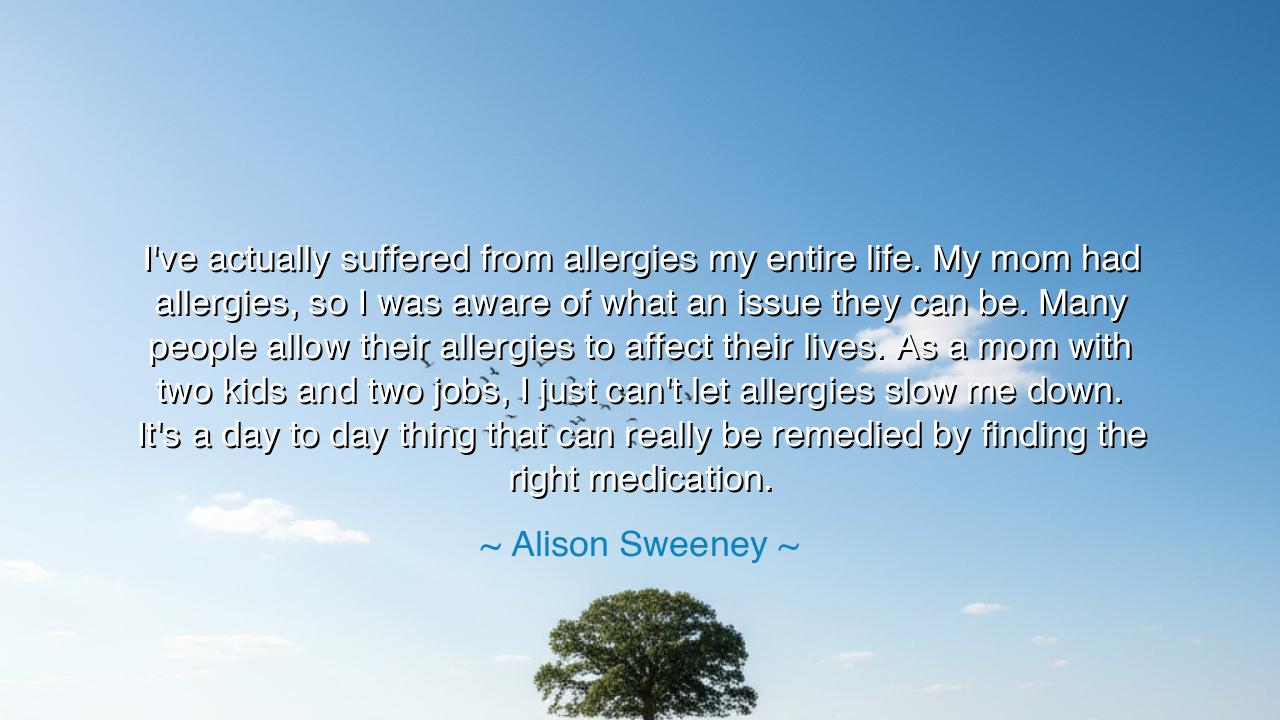
I've actually suffered from allergies my entire life. My mom had
I've actually suffered from allergies my entire life. My mom had allergies, so I was aware of what an issue they can be. Many people allow their allergies to affect their lives. As a mom with two kids and two jobs, I just can't let allergies slow me down. It's a day to day thing that can really be remedied by finding the right medication.






There is quiet perseverance and human truth in the words of Alison Sweeney, who said, “I've actually suffered from allergies my entire life. My mom had allergies, so I was aware of what an issue they can be. Many people allow their allergies to affect their lives. As a mom with two kids and two jobs, I just can't let allergies slow me down. It's a day to day thing that can really be remedied by finding the right medication.” Though she speaks of a physical ailment, her message rises beyond the body — it is a reflection on endurance, awareness, and the unyielding will to live fully despite limitation. In her tone is not complaint but courage, not resignation but resilience. It is a hymn to the spirit that refuses to bow before circumstance.
The origin of this quote lies in Sweeney’s personal life — a life that mirrors the challenge of countless working parents balancing health, family, and duty. As an actress, television host, and mother, she has lived beneath the bright lights of expectation, where weakness is easily magnified. Yet instead of hiding her struggle, she transforms it into a lesson on practicality and perseverance. Her words reveal the ancient wisdom of balance: that even when burdened by pain or difficulty, one must learn to adapt, to master what can be managed, and to press forward with grace.
The ancients, too, revered this strength — the discipline of living well amid imperfection. The philosopher Epictetus, born into slavery and lamed by injury, taught that the measure of a person lies not in what befalls them, but in how they respond. To suffer without surrender is to practice the art of fortitude. Sweeney’s determination to “not let allergies slow me down” echoes that same timeless truth. She does not deny her weakness; she conquers it through wisdom, awareness, and action. By finding the right remedy, she transforms suffering into stewardship of the self — the noble art of managing one’s condition without letting it command one’s destiny.
Consider the story of Helen Keller, who, though blind and deaf, transcended the barriers of her senses through discipline, patience, and the guidance of her teacher, Anne Sullivan. Keller once wrote, “Character cannot be developed in ease and quiet.” Like Sweeney, she refused to let limitation define her existence. Both women remind us that adversity, when faced with understanding rather than despair, becomes the crucible of character. Though their struggles differ in scale, their spirits share the same defiance — a refusal to yield to the forces that would confine them.
Sweeney’s mention of her mother’s allergies also carries deeper significance — it speaks of awareness passed from one generation to another, and of the importance of wisdom gained through experience. Her recognition of inherited challenges mirrors the ancient idea of ancestral knowledge: that we are shaped not only by our genes, but by the examples and lessons of those who came before us. Her mother’s understanding becomes her own; through her, she teaches her children the same lesson — that obstacles are not reasons for surrender, but opportunities for mastery.
In a world that often glorifies perfection and hides struggle, her words are refreshingly honest. They remind us that life’s difficulties — whether physical, emotional, or spiritual — need not become our identity. The key, as she says, lies in remedy, in the conscious act of seeking what heals rather than what hinders. The ancients would call this practical wisdom, the ability to discern and apply what is useful for the flourishing of life. It is a lesson that applies not only to illness, but to every trial we face. There is no honor in suffering needlessly when a cure exists; there is honor in seeking the cure and persevering with gratitude.
The lesson, my children, is this: never allow hardship to become the author of your life. Whether your burden is of the body or the spirit, do not let it define your days. Acknowledge it, understand it, and learn to master it through discipline, knowledge, and faith. Seek solutions, not excuses; remedies, not resignation. Like Alison Sweeney, rise each morning with resolve, knowing that strength is not the absence of struggle, but the triumph of purpose over pain.
For in the end, Alison Sweeney’s simple reflection becomes a universal teaching — that endurance is not about ignoring what hurts, but about continuing to live fully despite it. To care for oneself while caring for others, to face daily challenges with calm resolve, and to refuse to let limitation dictate destiny — these are the marks of true resilience. So let her words be a reminder: life will always test the body and the spirit, but the one who chooses action over despair will find healing not only in medicine, but in courage itself.






AAdministratorAdministrator
Welcome, honored guests. Please leave a comment, we will respond soon